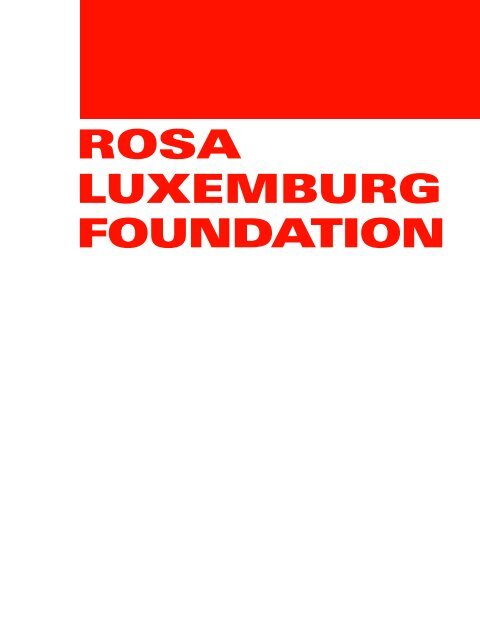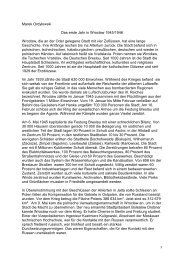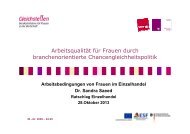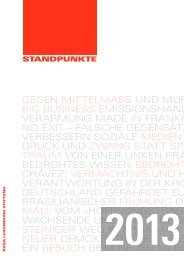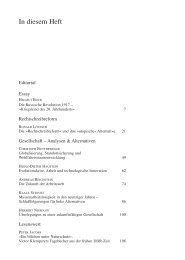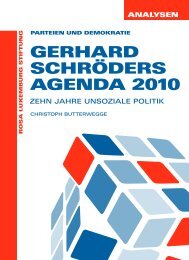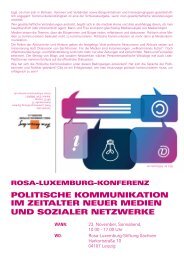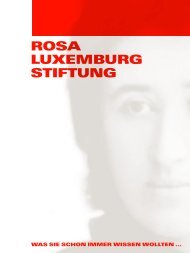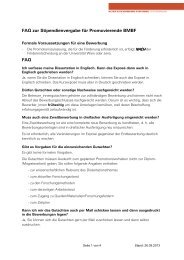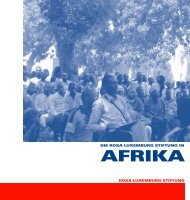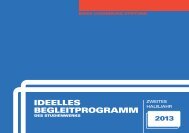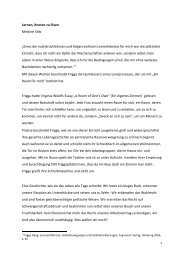Rosa Luxemburg Foundation Booklet - Rosa-Luxemburg-Stiftung
Rosa Luxemburg Foundation Booklet - Rosa-Luxemburg-Stiftung
Rosa Luxemburg Foundation Booklet - Rosa-Luxemburg-Stiftung
You also want an ePaper? Increase the reach of your titles
YUMPU automatically turns print PDFs into web optimized ePapers that Google loves.
<strong>Rosa</strong><br />
LuxembuRg<br />
<strong>Foundation</strong>
www.<strong>Rosa</strong>Lux.de<br />
Franz-mehring-platz 1 · 10243 berlin · +49 30 44310-0
<strong>Rosa</strong><br />
LuxembuRg<br />
<strong>Foundation</strong>
Contents<br />
<strong>Rosa</strong> <strong>Luxemburg</strong> 4<br />
Democratic Socialism 10<br />
<strong>Rosa</strong> <strong>Luxemburg</strong> <strong>Foundation</strong> 14<br />
Dependent <strong>Foundation</strong>s 20<br />
Academy for Political Education 26<br />
Institute for Critical Social Analysis 30<br />
Centre for International Dialogue and Co-operation 34<br />
Scholarship Department 40<br />
Nationwide Work 44<br />
Project Funding 48<br />
Archive/Library 50<br />
Publications 54<br />
Central Tasks 56<br />
The Network of <strong>Foundation</strong>s 60<br />
International Offices 66<br />
3
<strong>Rosa</strong> LuxembuRg<br />
<strong>Rosa</strong> <strong>Luxemburg</strong> (1871–1919) continues to polarise the political<br />
landscape to this day: by some she is considered a Bolshevik terrorist,<br />
for others she is a left wing icon. Although many of her writings<br />
have been reprinted, her thinking and intentions are currently by no<br />
means always accepted with great seriousness.<br />
Instead, the clichés persist. Both the Stalinists, who even invented<br />
a demonised «<strong>Luxemburg</strong>ism» for <strong>Rosa</strong> <strong>Luxemburg</strong>, and the political<br />
right loathe her concept of democracy. <strong>Rosa</strong> <strong>Luxemburg</strong> desired<br />
a society in which political freedom and equality would not be abolished,<br />
but rather complemented by social freedom and equality – a<br />
demand which has still not been fulfilled today. She considered democracy<br />
to be an essential prerequisite for all human coexistence.<br />
<strong>Rosa</strong> <strong>Luxemburg</strong> is often mistakenly considered to be German;<br />
hardly anyone knows that she was actually Polish. Many of her<br />
letters are even translated from German into other languages, although<br />
they were originally written in Polish. She came from an<br />
assimilated eastern Jewish family from Zamosc in Russian-Poland.<br />
The National Socialists, who renamed the city «Himmlerstadt»,<br />
after 1939 with their usual brutal methods tried to transform this<br />
Polish territory into the first «pure Germanic settlement area». The<br />
major extermination camps were located around Zamosc: Belzec,<br />
Majdanek, Sobibor.<br />
<strong>Rosa</strong> <strong>Luxemburg</strong> was a successful journalist, a brilliant orator –<br />
both in Polish and German – and an often misunderstood economist<br />
whose accumulation analyses today reveal surprising vision.<br />
However, she had no intention of being any of this.<br />
In 1890, <strong>Rosa</strong> <strong>Luxemburg</strong> left Warsaw, the city of her childhood<br />
and youth which was occupied by Tsarist Russia, to go to Swit-<br />
5
zerland and study botany. At that time, women only had access<br />
to higher education in Switzerland. However, after only a short<br />
time, her love for Leo Jogiches, a revolutionary from Vilnius who<br />
had taken refuge in exile in Switzerland, finally drew her into<br />
politics. This was to predetermine the rest of her life.<br />
In 1905, long since had their relationship completely shattered, she<br />
wrote to him full of bitterness: «In particular I hated the whole ‹politics›<br />
that stopped me from answering mother’s and father’s letters<br />
for weeks and I never had time for them because of these momentous<br />
tasks (and nothing has changed). And you I hate for being<br />
the person to have chained me forever to this cursed politics.» By<br />
then, she had already been living in Germany for seven years. On<br />
13 th March 1898, the twenty-seven year old had come to the country<br />
where she was to spend most of her time in prison, which amounted<br />
to a total of forty-eight months, and where she would be murdered<br />
at the age of forty-eight.<br />
Once at the border, the woman with the harsh accent had been able<br />
to identify herself as a Prussian citizen and thereby a German national.<br />
The extremely self-confident solitary traveller of small build<br />
yet great charisma had acquired the document as a result of a marriage<br />
of convenience. She took to signing hotel registration forms<br />
with the name «Frau Gustav Lübeck».<br />
She had got on the train having joined the Social Democratic Party<br />
of Germany (SDP) – which had formed to fight for emancipation<br />
from all conditions in which human beings were deprived, enslaved,<br />
abandoned, worthless beings; for conditions in which needs were<br />
no longer subordinate to profit-oriented production, but where production<br />
is attributed to the satisfaction of needs – to find the political<br />
home which she was denied in her country of origin, because<br />
there she was wanted by the police.<br />
Only seven years later however, after a truly pleasant honeymoon<br />
period, her relationship to Bebel and Liebknecht’s party, the most<br />
6
important socialist union in the world at the time, died a slow and<br />
inevitable death. The funeral was held on the date that the SPD<br />
Reichstag fraction voted in favour of the war bonds for mass murder<br />
on the battlefields of what, after the American civil war, was the<br />
second «modern war». The date was 4 th August 1914.<br />
<strong>Rosa</strong> <strong>Luxemburg</strong> differed from Lenin and his followers mainly on<br />
the question of the role of the elite, that is, the party. For <strong>Rosa</strong> <strong>Luxemburg</strong><br />
socialism did not come about in political parties or at party<br />
circles. Central to the party’s politics, so <strong>Rosa</strong> <strong>Luxemburg</strong>, was an<br />
increase in the self-confidence of the masses as well as its capacity<br />
for political action. The party should make suggestions to the class,<br />
but let the class, i. e. the individuals directly concerned, make the<br />
decisions – even at the risk of rejection, which should be accepted<br />
in any case.<br />
According to <strong>Rosa</strong> <strong>Luxemburg</strong>, not the party could fight for socialism<br />
but only the entire class, while having a clear understanding of<br />
class. For <strong>Rosa</strong> <strong>Luxemburg</strong> class existed as a movement – or not at<br />
all. Those who took part in the class movement belonged to it no<br />
matter where their cradle had stood or how they earned a living.<br />
In 1922, in his introduction to the «Russian Revolution», Paul Levi<br />
explained why <strong>Rosa</strong> <strong>Luxemburg</strong> considered the freedom of those<br />
who think differently so important and why she did not want to<br />
exclude anyone from this freedom. With Paul Levi, who had been<br />
one of her lawyers since 1913, <strong>Rosa</strong> <strong>Luxemburg</strong> was involved in<br />
a (turbulent) love affair in 1913, which lasted only a few months.<br />
After <strong>Rosa</strong>’s murder and after the murder of her first husband, Leo<br />
Jogiches (in March 1919 in Moabit prison), Paul Levi was elected<br />
Chairman of the newly-founded German Communist Party on<br />
1 st January 1919. In 1921 however, he was expelled from the Communist<br />
Party which was moving towards Bolshevism.<br />
In his introduction to the «Russian Revolution», which was first published<br />
by him and was the best known and most important political<br />
7
work by <strong>Rosa</strong> <strong>Luxemburg</strong>, Levi wrote: «She knew how to fight a<br />
battle as a battle; wage war as war; civil war as civil war. However,<br />
she could only imagine civil war to be a free play of forces, in which<br />
even the bourgeoisie is not banished to the cellar by the police, as<br />
only in the open battle of the masses can these grow and recognise<br />
the size and significance of their struggle.<br />
She no more wanted the destruction of the bourgeoisie by unproductive<br />
terrorism, by the tedious business of the hangman, than<br />
the hunter in the forest wants to destroy the predators there. In the<br />
struggle with them, wild game will become stronger and bigger.<br />
For her, the destruction of the bourgeoisie, which she also wanted,<br />
was the result of social upheaval, which meant revolution.»<br />
The Jewish Polish woman and socialist who abhorred all terror<br />
died at the hands of right-wing terrorists in German uniform on<br />
15 th January 1919 in Berlin’s Tiergarten.<br />
8
demoCRatiC<br />
soCiaLism
Democratic socialism arose from a protest against capitalist society,<br />
against exploitation, oppression and war. It calls for freedom, equality<br />
and solidarity for each and everyone. According to Karl Marx,<br />
the categorical imperative of socialism is to «overthrow all relations<br />
in which man is a debased, enslaved, forsaken, despicable being.»<br />
Socialism was formed as a universal human rights movement in<br />
solidarity from below. It joined forces with the workers’ movement,<br />
women, with colonial peoples in their struggle for liberation. Its goal<br />
is a society in which people have economic control and take their<br />
affairs into their own hands.<br />
The 20 th century was characterised by a deep split in the socialist<br />
movement. On one side a communist wing developed which,<br />
under the impact of war and fascism, was prepared to implement<br />
a radical break with capitalism even by means of dictatorship and<br />
the oppression of dissent. Protest by workers and civil rights activists<br />
and democratic reforms in 1989 led to the collapse of state<br />
socialist societies in Europe. Centralised state ownership in the<br />
end proved to be an obstacle to its development. Social standards<br />
could not be maintained in the long term. On the other side, social<br />
forces wanted extensive social reforms and democratisation.<br />
However, they were not able to eradicate the dominance of profit<br />
and to control the economy effectively. It was thus not possible<br />
to prevent a neoliberal relapse into unleashed capitalism. Left-socialist<br />
forces supported councils, workers’ autonomy, economic<br />
democracy and cooperatives, but could not implement a comprehensive<br />
alternative.<br />
In the current crisis of capitalism and human civilisation new socialist<br />
movements are forming. Their basic position is: another world<br />
is not only possible, it is urgently needed. This socialism of the<br />
21 st Century fights capitalist exploitation, patriarchy, racism and<br />
environmental destruction. The objective is a world in which many<br />
11
worlds can exist together, in which the free development of each<br />
and every individual becomes the condition of the joint development<br />
of all. Subordinating property and power relations to this<br />
objective, a socio-ecological transformation of production and way of<br />
life, the democratisation of democracy, a new internationalism, and<br />
an active peace policy are the main features of this new socialism.<br />
With the left party, a political force has arisen in Germany that<br />
is committed to democratic socialism. Representing the interests<br />
of wage earners, the socially weak, broad sections of society is<br />
linked to a policy of comprehensive transformation and the defeat<br />
of capitalism. It stands in the tradition of <strong>Rosa</strong> <strong>Luxemburg</strong>: equality<br />
without freedom is oppression. Freedom without equality is exploitation.<br />
Solidarity is the shared root of liberty and equality. The<br />
exploitation of human by human and of nature must be brought to<br />
an end collectively.<br />
12
the contempt of life and<br />
the brutality against<br />
human beings reveal<br />
mankind’s capacity for<br />
inhumanity. it can not be<br />
and must not remain a<br />
means of resolving any<br />
sort of conflict.<br />
<strong>Rosa</strong> LuxembuRg<br />
Quote on the plaque of the <strong>Rosa</strong> <strong>Luxemburg</strong> memorial in Tiergarten<br />
Landwehrkanal, berlin<br />
13
<strong>Rosa</strong><br />
LuxembuRg<br />
<strong>Foundation</strong>
The <strong>Rosa</strong> <strong>Luxemburg</strong> <strong>Foundation</strong> is one of the six political foundations<br />
in the Federal Republic of Germany. The <strong>Foundation</strong>’s main<br />
task is to provide political education. It is close to the left party.<br />
Since 1990, the <strong>Rosa</strong> <strong>Luxemburg</strong> <strong>Foundation</strong> has been active in<br />
keeping with its eponym, <strong>Rosa</strong> <strong>Luxemburg</strong> and represents the<br />
main current of democratic socialism with a deliberate international<br />
focus. The <strong>Foundation</strong> considers itself committed to a<br />
radical perspective of social processes and developments, and<br />
works within the tradition of workers and women’s movements<br />
as well as anti-fascism and anti-racism.<br />
The <strong>Rosa</strong> <strong>Luxemburg</strong> <strong>Foundation</strong> is a registered non-profit organisation,<br />
whose most important body is the General Assembly.<br />
Its work is supported by the dedication and commitment of<br />
many volunteers nationwide.<br />
With its work the <strong>Foundation</strong> promotes a critical analysis of society<br />
and fosters networks of emancipatory activists and progressive<br />
cultural approaches. It is active internationally in the field of<br />
development co-operation and equal dialogue, and with the help<br />
of the Archive of Democratic Socialism, it documents important<br />
political events. Within the framework of its Scholarship Department,<br />
the <strong>Foundation</strong> also provides grants to young scientists.<br />
Just as the other political foundations, the <strong>Rosa</strong> <strong>Luxemburg</strong><br />
<strong>Foundation</strong> seeks to further develop the classical concept of political<br />
education. However, the <strong>Rosa</strong> <strong>Luxemburg</strong> <strong>Foundation</strong> here<br />
emphasises a critical analysis of society as its central task, a<br />
claim further underlined by its name.<br />
Social change requires a reflective confrontation with today’s capitalist<br />
society as a whole. The <strong>Rosa</strong> <strong>Luxemburg</strong> <strong>Foundation</strong> has set itself<br />
the goal of developing alternative concepts and approaches for processes<br />
of transformation which enable a more united and just society.<br />
15
Education and training in socialist-democratic politics, analysis,<br />
information and policy advice are thereby basic tasks of the national<br />
and also international framework of the <strong>Foundation</strong>’s work.<br />
The <strong>Rosa</strong> <strong>Luxemburg</strong> <strong>Foundation</strong> comprises:<br />
n The General Assembly and the Executive Board and<br />
Scientific Advisory Council elected by it<br />
n Currently about 130 full-time employees, including 14 heads<br />
of international offices and 15 colleagues in 13 regional<br />
offices in Germany<br />
n Several full-time employees and numerous volunteers in<br />
the 16 state foundations of the <strong>Rosa</strong> <strong>Luxemburg</strong> <strong>Foundation</strong>,<br />
on boards and advisory boards, as active members and<br />
organisations of local education, and in the <strong>Rosa</strong> <strong>Luxemburg</strong><br />
Clubs<br />
n More than 40 employees and local personnel in the<br />
international offices of the <strong>Foundation</strong><br />
n About 120 tutors<br />
n About 700 current and about 1 000 former scholarship holders;<br />
n Numerous other volunteers who are for example active in<br />
the currently 18 discussion groups of the <strong>Foundation</strong>.<br />
geneRaL assembLY<br />
The General Assembly is the highest body of the foundation or<br />
the association. At least once a year, the almost 100 active members<br />
come together for a general meeting.<br />
The Assembly’s main tasks include determining the thematic focus<br />
of the association’s activities, appointing the honorary board<br />
and the members of the Scientific Advisory Board, and electing<br />
the Executive Board. The General Assembly also receives the<br />
Executive Board’s reports and decides on the admission of new<br />
16
members. Besides, it is paid attention, that as many women,<br />
as men are considered. Currently, the membership of the <strong>Rosa</strong><br />
<strong>Luxemburg</strong> <strong>Foundation</strong> does not exceed 100 active members.<br />
Passive members are persons who are directly or indirectly in a<br />
permanent employment relationship with the <strong>Rosa</strong> <strong>Luxemburg</strong><br />
<strong>Foundation</strong>. The detailed rights and obligations of the General<br />
Assembly are regulated in the <strong>Rosa</strong> <strong>Luxemburg</strong> <strong>Foundation</strong>’s<br />
statutes. The General Assembly includes current and former politicians<br />
of the left, scientists, those active in the regional foundations<br />
of the <strong>Rosa</strong> <strong>Luxemburg</strong> <strong>Foundation</strong> and other personalities<br />
from a broadly understood democratic-socialist current,<br />
which extends beyond the immediate affiliated political party. An<br />
overview of the members can be found on the <strong>Rosa</strong> <strong>Luxemburg</strong><br />
<strong>Foundation</strong>’s website.<br />
exeCutiVe boaRd<br />
The Executive Board of the <strong>Rosa</strong> <strong>Luxemburg</strong> <strong>Foundation</strong> is elected<br />
by the General Assembly for four years and consists of the<br />
chairperson, the two vice chairpersons, the executive director,<br />
and at least seven and a maximum of 9 further members. Currently<br />
(May 2010), the Board consists of 13 members.<br />
With the exception of the executive director, the Executive<br />
Board of the <strong>Rosa</strong> <strong>Luxemburg</strong> <strong>Foundation</strong> is a voluntary committee.<br />
A balanced gender ratio is also observed when selecting<br />
the members of the board. The main task of the Executive<br />
Board is to manage the affairs of the association and to specify<br />
the basic course of the foundation’s work. In this sense, the<br />
Executive Board decides on the fundamental structure of the<br />
foundation and the cornerstones of its financial and personnel<br />
structure. In observance of the requirements, members of the<br />
boards of political parties at a federal or state level may not sit<br />
on the Executive Board of the <strong>Rosa</strong> <strong>Luxemburg</strong> <strong>Foundation</strong>. For<br />
17
the current structure of the Executive Board please consult the<br />
<strong>Foundation</strong>’s website.<br />
Chairman of the Executive Board of the <strong>Rosa</strong> <strong>Luxemburg</strong> <strong>Foundation</strong>: HEINZ VIETZE<br />
Deputies: THOMAS HÄNDEL (MdEP); NN<br />
Executive Board Member: DR. FLORIAN WEIS<br />
sCientiFiC adVisoRY boaRd<br />
This honorary advisory committee of the <strong>Rosa</strong> <strong>Luxemburg</strong> <strong>Foundation</strong><br />
was established by a resolution of the General Assembly<br />
in 2008. The Scientific Advisory Board consists of at least six<br />
and a maximum of sixteen members (May 2010: eight women<br />
and eight men). Association membership is not a condition for<br />
participating in the Scientific Advisory Board. In the same way<br />
as the <strong>Rosa</strong> <strong>Luxemburg</strong> <strong>Foundation</strong>’s Executive Board, Advisory<br />
Board members are elected for four years. The Scientific Advisory<br />
Board supports the work of the <strong>Foundation</strong> in particular concerning<br />
aspects of a scientific and strategic nature. The council<br />
members elect one of their number as chairperson.<br />
Head of the Scientific Advisory Board: DR. ALBERT SCHARENBERG<br />
Deputy: PROF. DR. IRENE DÖLLING<br />
CounCiL oF RegionaL <strong>Foundation</strong>s<br />
The 16 autonomous regional foundations are all members of the<br />
Council of Regional <strong>Foundation</strong>s. Together with the <strong>Rosa</strong> <strong>Luxemburg</strong><br />
<strong>Foundation</strong>, they organise educational programmes and<br />
networking in all federal states. Similarly to the head of the Scientific<br />
Advisory Board, the spokesperson of the Council of Regional<br />
<strong>Foundation</strong>s attends the meetings of the Executive Board in an<br />
advisory capacity.<br />
18
More information is available on the website.<br />
Spokesperson of the Council of Regional <strong>Foundation</strong>s: NORBERT SCHEPERS<br />
(<strong>Rosa</strong> <strong>Luxemburg</strong> Initiative Bremen)<br />
Deputy: DR. DETLEF NAK ATH (<strong>Rosa</strong> <strong>Luxemburg</strong> <strong>Foundation</strong> Brandenburg)<br />
19
dePendent<br />
<strong>Foundation</strong>s
HeRmann HenseLmann <strong>Foundation</strong><br />
The lawyer Dr. Andreas Henselmann, son of the architect Hermann<br />
Henselmann (1905–1995), founded the Hermann Henselmann<br />
<strong>Foundation</strong>. The <strong>Foundation</strong> promotes an examination of<br />
issues concerning architecture, urban planning and social urban<br />
development. Here, the Hermann Henselmann <strong>Foundation</strong> does<br />
not only wish to remember the work of the architect, but also<br />
and above all seeks to deal with the social and cultural aspects<br />
of construction of the recent past and the present. The executive<br />
board of the Hermann Henselmann <strong>Foundation</strong> is comprised<br />
of Thomas Flierl and Andreas Henselmann. A scientific advisory<br />
board advises the foundation.<br />
The <strong>Rosa</strong> <strong>Luxemburg</strong> <strong>Foundation</strong> has fiduciary responsibility for<br />
the legally dependent foundation, which in the framework of its<br />
statute acts independently as regards content.<br />
Internet: www.hermann-henselmann-stiftung.de<br />
E-Mail: info@hermann-henselmann-stiftung.de<br />
max LingneR <strong>Foundation</strong><br />
The Max Lingner <strong>Foundation</strong> seeks to maintain, represent and disseminate<br />
the work of the painter and graphic artist Max Lingner<br />
(1888–1959) and to remember the art of the 20 th Century, which<br />
was shaped by emigration, war and prison camps, as well as the<br />
cultural awakening in the post-war period.<br />
The foundation was established in 2007 by the art historian<br />
Dr. Gertrud Heider (1928–2007), after she had devoted decades to<br />
preserving, accessing and communicating Lingner’s work. Today,<br />
as Gertrud Heider decreed in her will, the foundation is managed<br />
in trust by the <strong>Rosa</strong> <strong>Luxemburg</strong> <strong>Foundation</strong>. Members of the board<br />
of the thematically independent Max Lingner <strong>Foundation</strong> are<br />
Dr. Thomas Flierl (Chairman), Dr. Stefan Hahne and Martin Groh.<br />
21
They are advised and supported by a board of trustees in fulfilling<br />
the foundation’s aim. The <strong>Foundation</strong> is located in the former home<br />
and studio of Max Lingner in Berlin-Niederschönhausen.<br />
Internet: www.max-lingner-stiftung.de<br />
E-Mail: info@max-lingner-stiftung.de<br />
CuLtuRaL FoRum oF tHe <strong>Rosa</strong> LuxembuRg<br />
<strong>Foundation</strong><br />
The Cultural Forum of the <strong>Rosa</strong> <strong>Luxemburg</strong> <strong>Foundation</strong> is located in<br />
the Max Lingner <strong>Foundation</strong>. It organises projects, lecture series and<br />
publications on issues of cultural policy. The Cultural Forum contributes<br />
to a systematic examination of the cultural dimensions of<br />
social development. The emphasis in recent years was for example<br />
on aspects of the culture of remembrance and the politics of history.<br />
The Cultural Forum of the <strong>Rosa</strong> <strong>Luxemburg</strong> <strong>Foundation</strong> is headed by<br />
Thomas Flierl, employee of the Cultural Forum is Michaela Klingberg.<br />
E-Mail: kulturforum@rosalux.de<br />
HaRaLd bReueR <strong>Foundation</strong><br />
The trust foundation was established in 2006. The objective of the<br />
Harald Breuer <strong>Foundation</strong> is to promote political education, science<br />
and research as well as international understanding and cooperation,<br />
and to contribute to promoting the development of free<br />
thinking and solidarity in a humanistic, democratic and internationalist<br />
spirit. The foundation is active on a national and in particular<br />
an international level. Special emphasis is on development co-<br />
operation. Together with INTACT e.V., the foundation is currently<br />
preparing and implementing a two-year project to end female<br />
genital mutilation in the region of Kolda in southern Senegal and<br />
22
adjacent areas in Gambia and Guinea-Bissau. In 2010, the foundation<br />
also financially supported a project of the society «Berliner<br />
Entwicklungspolitischer Ratschlag e.V.» to create a commemorative<br />
plaque at the May-Ayim-Ufer in order to increase awareness of<br />
and examine colonialism and racism in the city.<br />
Board: DR. EVELIN WIT TICH (chair); DR. GESINE LÖTZSCH,<br />
DR. ARNDT HOPFMANN<br />
Founder: PROF. DR. HARALD BREUER<br />
miCHaeL sCHumann <strong>Foundation</strong><br />
The Michael Schumann <strong>Foundation</strong> is a dependent foundation of<br />
the <strong>Rosa</strong> <strong>Luxemburg</strong> <strong>Foundation</strong>. The foundation’s name, Michael<br />
Schumann, is a direct reference to one of the most prominent and<br />
respected politicians of the PDS, who lost his life in a tragic car<br />
accident towards the end of the year 2000.<br />
Prof. Dr. Schumann held a path-breaking speech at the extraordinary<br />
party congress in December 1989. He demanded that the<br />
newly formed socialist party deliver a clear rejection of Stalinism.<br />
Michael Schumann also opposed any «superstitious belief in the<br />
potential of state instruments of force, which were deprived of all<br />
forms of democratic control». As a political intellectual, he authentically<br />
embodied the need to theoretically and ethically adjust the<br />
political practice of the party. He convincingly implemented his demands<br />
in his conceptual influence and his work as a member of<br />
the regional parliament in Brandenburg. In his spirit, the Michael<br />
Schumann <strong>Foundation</strong> aims to promote political education, science<br />
and research, international understanding and co-operation. In<br />
2007, the Michael Schumann <strong>Stiftung</strong> purchased the Dietz Verlag.<br />
Board: PROF. DR. DIETER KLEIN (Chairman); HEINZ VIETZE,<br />
DR. LUTZ BRANGSCH<br />
23
eRiK neutsCH <strong>Foundation</strong><br />
In May 2006, the foundation was established as a dependent charitable<br />
foundation. It seeks to encourage science and research, art<br />
and culture as well as international understanding and co-operation.<br />
With its establishment, Erik Neutsch also pursued the objective<br />
of contributing to the development of free thinking and<br />
solidarity in a humanitarian, democratic and internationalist spirit.<br />
Here, literature and art are to be given particular consideration. The<br />
artistic legacy of the founder is preserved and cared for under the<br />
trusteeship of the <strong>Rosa</strong> <strong>Luxemburg</strong> <strong>Foundation</strong>. The Erik Neutsch<br />
<strong>Foundation</strong> also supports scientific events, awards research contracts,<br />
and assists talented literary scientists and authors.<br />
Board: DR. EVELIN WIT TICH (Chair); KL AUS HOPKE, ANNE NEUTSCH,<br />
ERIK NEUTSCH<br />
24
EXHIBITION:<br />
PALACE, PALAST DER REPUBLIK, HUMBOLD-FORUM<br />
MITTE SPREEINSEL BERLIN – A SITE OF HISTORICAL RUPTURES<br />
25<br />
PHOTO: GERHARD ZwICkERT
aCademY FoR<br />
PoLitiCaL<br />
eduCation
The central task of the Academy is political education in the spirit<br />
of left political currents in Germany, which includes dealing with<br />
areas of social conflict by means of participatory, emancipatory<br />
and critical education. This does not only entail a diversity of methods<br />
and monitoring educational process while constantly being<br />
aware of what is new, particularly in groups, but also involves the<br />
task of consciously creating educational space. We aim to empower<br />
by enabling the acquisition of knowledge.<br />
The Academy offers courses and training in the form of political<br />
education. It also organises conferences and workshops, and plans<br />
series of events and weekend seminars. Much of the work encompasses<br />
advice and expertise, creating educational materials and<br />
producing publications. The Academy also offers the opportunity<br />
to participate in various networks and projects. Committed art is<br />
also considered a part of political education.<br />
The Academy’s fields of activity include:<br />
n Politics – communication – management and providing<br />
basic adult education for political learning. We participate<br />
in a theoretical discourse on emancipatory political education,<br />
in particular via the discussion group Political Education.<br />
n The Kommunalakademie (Communal Academy) picks up on<br />
the diversity of issues of local politics in basic workshops<br />
and seminars as well as the accompanying publication<br />
series «Crashkurs Kommune». In depth work is done for<br />
example on participatory budget policy, anti-privatisation,<br />
remunicipalisation and urban policy.<br />
n The Jugendbildungswerk (Centre for Youth Education) offers<br />
nationwide events on the basis of promoting projects of<br />
youth education and a network of organisations connected<br />
to the association of foundations. It works with a view to<br />
27
28<br />
criticising, discovering alternatives, strengthening resistance<br />
and creating freedom.<br />
The social areas of conflict that are dealt with by the Academy<br />
include:<br />
Social inequalities and the dimensions of economic and ecological<br />
crises, sustainability and regional development, the confrontation<br />
with neo-Nazism and ideologies of inequality. Gender<br />
inequality in society, politics and everyday life are interdisciplinary<br />
issues. We offer a space for discussing gender equality in<br />
areas such as economics and (new) work, the public and private,<br />
distribution and participation, the acceptance of lifestyles (body<br />
and sexuality). We are involved in a left-wing feminist discussion<br />
of values. Issues of contemporary history are for example<br />
approached with the help of contemporary witnesses and biographical<br />
learning. We discuss the processes and consequences<br />
of globalised production and reproduction, new international developments<br />
and social movements, and participate in the Social<br />
Forums at an international, European and national level. Work<br />
on and with the eponym of our foundation are also among the<br />
central tasks of the Academy.<br />
The basic service of the Academy includes:<br />
n The Attacademie (course on «economic literacy» in<br />
co-operation with Attac)<br />
n The Capital reading groups and an annual Marx<br />
autumn school<br />
n The course «Politics – Communication – Management»<br />
n The annual summer school in Wietow on sustainable<br />
development
The work of the Academy on Political Education is supported and<br />
accompanied by the discussion groups on women and politics,<br />
sustainability and regional development, history for the future,<br />
right-wing extremism, social issues and rural areas.<br />
Director: DR. EVELIN WIT TICH wittich@rosalux.de<br />
Contact: STEFFEN KÜHNE kuehne@rosalux.de<br />
29
institute FoR<br />
CRitiCaL soCiaL<br />
anaLYsis
The work of the Institute for Critical Social Analysis is based on<br />
critique – analysis and critique of the transformations in capitalism<br />
and society. This critique focuses on practice: developing basic approaches<br />
and central themes of socialist transformation research.<br />
Here, the Institute for Critical Social Analysis continues in the<br />
tradition of a critical, Marxist and feminist critique of capitalism<br />
and domination, while at the same time picking up on both the<br />
empirical and theoretical results of other modern social sciences.<br />
Within this context, the <strong>Rosa</strong> <strong>Luxemburg</strong> <strong>Foundation</strong>’s IfG (Institute<br />
for Critical Social Analysis) considers itself to be a player of<br />
far-reaching research activities.<br />
Founded in 2008, the IfG is active in the following areas:<br />
n Analysis and critique of capitalism, approaches of<br />
socio-ecological transformation, in particular of alternative<br />
economic and property ownership<br />
n Fundamental questions on the history of as well as present<br />
day basic socialist currents, emancipatory left actors, their<br />
strategies and projects<br />
n Policy analysis and the democratic renewal of the economic<br />
system, of the welfare state, and of ownership and power<br />
relations<br />
n Left strategies of the European Union’s development, of<br />
peace and security policy and international co-operation<br />
n Identity and difference: theoretical approaches and political,<br />
social and cultural practices of the players of emancipatory<br />
movements and changes in lifestyle.<br />
The Institute seeks to develop an independent conceptual approach<br />
and guiding principles of research on socialist transformation.<br />
The staff invites you to join them to discuss transformational<br />
perspectives within Germany and internationally.<br />
31
By way of workshops, conferences and publications, the IfG contributes<br />
to a continuous process of discussion of the left in Germany<br />
and abroad. It supports scientific projects of the left and<br />
provides teaching and training on left theory, politics and socialist<br />
perspectives. In terms of a radical Realpolitik, it draws up projects<br />
of concrete utopias and emancipatory ways of creating a caring<br />
society. The deep crisis of neoliberal financial market capitalism is<br />
seen in its dimension as a new historical situation, which besides<br />
harbouring new dangers also creates opportunities for intervention<br />
and extensive transformation.<br />
Analysing these opportunities and dangers and then developing proposals<br />
is considered to be the central task of the Institute.<br />
Director: PROF. DR. MICHAEL BRIE<br />
Contact: UTA TACKENBERG tackenberg@rosalux.de<br />
32
33<br />
PHOTO: TRANqUILLIUM PHOTOGRAPHy
CentRe FoR<br />
inteRnationaL<br />
diaLogue and<br />
Co-oPeRation
The central concern of the <strong>Rosa</strong> <strong>Luxemburg</strong> <strong>Foundation</strong>’s international<br />
work is to contribute to social and democratic development<br />
and to promote socio-political education and communication together<br />
with international partners.<br />
With this in mind, the <strong>Rosa</strong> <strong>Luxemburg</strong> <strong>Foundation</strong> funds projects<br />
with the aim of providing people with equal access to basic social<br />
goods such as democratic participation, peace and non-violence,<br />
employment, education, health, social security and an environment<br />
worth living in. The <strong>Rosa</strong> <strong>Luxemburg</strong> <strong>Foundation</strong> therefore<br />
works primarily with trade unions, women’s organisations, social<br />
movements, research and education institutes, and international<br />
organisations and parties.<br />
Key themes of the <strong>Rosa</strong> <strong>Luxemburg</strong> <strong>Foundation</strong>’s international<br />
work are an international examination of current neoliberal tendencies<br />
of globalisation, the creation of a social and peaceful Europe,<br />
democratic and social participation at a national, regional and local<br />
level, peace and the prevention of violence, and the full and equal<br />
integration of disadvantaged groups.<br />
Inspired by the ideas and concepts of democratic socialism and<br />
united co-operation, the <strong>Rosa</strong> <strong>Luxemburg</strong> <strong>Foundation</strong>, which is<br />
close to the left party, is active internationally in order to:<br />
n protect the rights of democratic participation<br />
n secure access to public goods and lay the foundations for a<br />
self-determined life for all<br />
n strengthen the networks of civil society actors and develop<br />
alternatives to the neoliberal economic model<br />
n solve conflicts peacefully, and shape the present and future<br />
with historical consciousness<br />
35
Currently, the <strong>Rosa</strong> <strong>Luxemburg</strong> <strong>Foundation</strong> is actively involved in<br />
over 50 countries and with about 200 partner organisations. It has<br />
14 offices in the regions of Central and Eastern Europe, East and<br />
South Asia, western and southern Africa, South and Central America,<br />
and in the Eastern Mediterranean. For the implementation of<br />
projects in these regions, the <strong>Rosa</strong> <strong>Luxemburg</strong> <strong>Foundation</strong> has at<br />
its disposal funds from the budget of the Federal Ministry for Economic<br />
Co-operation and Development.<br />
The supervision of co-operation projects abroad takes place in the<br />
regional departments in Berlin. A summary of the work, along with<br />
current analyses from partner countries, is available on the <strong>Rosa</strong><br />
<strong>Luxemburg</strong> <strong>Foundation</strong>’s website.<br />
Director: WILFRIED TELK ÄMPER (from July 2010)<br />
Deputy Director: JÖRG SCHULTZ<br />
Contact: RENATE TILTSCH tiltsch@rosalux.de<br />
36
37<br />
PHOTO: ROSA LUxEMBURG FOUNDATION
inteRnationaL Regions<br />
38<br />
mexiCo<br />
Quito<br />
são PaoLo
daKaR<br />
beRLin<br />
waRsaw<br />
bRusseLs<br />
beLgRade<br />
mosCow<br />
teL aViV<br />
RamaLLaH<br />
JoHannesbuRg<br />
new deLHi<br />
Hanoi<br />
beiJing<br />
39
sCHoLaRsHiP<br />
dePaRtment
The scholarship department awards scholarships to students and<br />
postgraduates at home and abroad who are highly qualified and<br />
have a strongly developed social commitment. We aim to compensate<br />
for social, political and gender discrimination. Preference is<br />
therefore given to applications from women, students from nonacademic<br />
backgrounds or those with a migration background, the<br />
socially needy and people with disabilities who demonstrate comparable<br />
achievements and commitment. Applications are actively<br />
encouraged from students and postgraduate students of all scientific<br />
and technical disciplines and graduates of technical colleges.<br />
The selection and sponsorship criteria are as follows:<br />
n Very good professional qualifications (proof of above average<br />
academic achievement either at school and/or university)<br />
n Political and social and/or societal commitment in keeping<br />
with the ideals of the <strong>Rosa</strong> <strong>Luxemburg</strong> <strong>Foundation</strong><br />
n Personal/family background<br />
The <strong>Rosa</strong> <strong>Luxemburg</strong> <strong>Foundation</strong>‘s Scholarship department works<br />
on the principle of direct application. Information on grant eligibility<br />
requirements and application forms for the scholarship programmes<br />
can be found on the <strong>Rosa</strong> <strong>Luxemburg</strong> <strong>Foundation</strong> website<br />
(www.rosalux.de) on the scholarships page.<br />
These documents will not be sent by post.<br />
deadLines FoR aPPLiCations<br />
For grants starting in the winter semester:<br />
30 th April of the same year<br />
For grants starting in the summer semester:<br />
31 st October of the previous year<br />
41
tHe sCHoLaRsHiP PRogRammes<br />
sTuDY sCHoLaRsHIPs FoR bILDuNgsINLÄNDeR<br />
(eDuCaTIoNaL ResIDeNTs) 1<br />
Funding is available for students of all disciplines and all state approved<br />
institutes of higher education. The duration of the grant<br />
and amount of funding are based on law of the federal education<br />
support. Funding is possible from the second semester onwards.<br />
PHD sCHoLaRsHIPs<br />
The Scholarship Department awards grants to domestic and foreign<br />
PhD students of all disciplines (except medicine, dentistry and<br />
veterinary medicine). As a rule, funding lasts for two years, this<br />
may be extended twice for a period of six months in justified cases.<br />
sCHoLaRsHIPs FoR FoReIgNeRs<br />
The Scholarship Department awards grants to foreign students<br />
and PhD students who are temporarily resident in Germany for<br />
study or research purposes.<br />
sTuDY oR PHD sPoNsoRsHIP sCHeme<br />
The <strong>Rosa</strong> <strong>Luxemburg</strong> <strong>Foundation</strong>’s Scholarship Department offers<br />
their stipendiaries a wide range of support, consisting of<br />
events on political education and summer schools, workshops at<br />
home and abroad, symposia and educational trips. It also organises<br />
events on the development of key skills such as rhetoric and<br />
conflict management; time management and self-management;<br />
the development of scientific qualifications; PhD student seminars;<br />
text and writing workshops; and seminars on methodology.<br />
1 Funding will be provided to persons who belong to the group of persons specified under § 8 BAföG as well<br />
as students with a migration background who have prospects of permanent residence in Germany. To a<br />
limited extent this fund may also be used to assist EU citizens.<br />
42
Particular importance is given to the self-organisation of stipendiaries<br />
and to working groups. The work of the scholarship department<br />
is assisted by almost 120 tutors nationwide as well as the<br />
staff of the <strong>Rosa</strong> <strong>Luxemburg</strong> <strong>Foundation</strong> and its network.<br />
Director: DR. K ATRIN SCHAEFGEN<br />
Contact: K ATJA VOSS studienwerk@rosalux.de<br />
43
nationwide<br />
woRK
The <strong>Rosa</strong> <strong>Luxemburg</strong> <strong>Foundation</strong> is a party affiliated foundation<br />
which is active throughout Germany. The events, publications and<br />
other activities of our partners in the federal states are an important<br />
part of our political education programme. These include regional<br />
foundations, regional offices, <strong>Rosa</strong> <strong>Luxemburg</strong> Clubs and<br />
many other regular co-operation partners. This close co-operation<br />
allows more than 2 000 events to be carried out annually throughout<br />
Germany. With this offer, the <strong>Rosa</strong> <strong>Luxemburg</strong> <strong>Foundation</strong> addresses<br />
the immediate environment of the left party, as well as a<br />
general public interested in political education.<br />
The <strong>Rosa</strong> <strong>Luxemburg</strong> <strong>Foundation</strong>’s network of foundations consists<br />
of 16 legally independent regional foundations along with<br />
the <strong>Rosa</strong> <strong>Luxemburg</strong> <strong>Foundation</strong> at a federal level. The network<br />
is organised in a regional council in which each foundation has a<br />
voice. This regional council represents the regional foundations to<br />
the Executive Board of the <strong>Rosa</strong> <strong>Luxemburg</strong> <strong>Foundation</strong>. In most<br />
federal states (except for Berlin, Brandenburg and Saxony), the<br />
<strong>Rosa</strong> <strong>Luxemburg</strong> <strong>Foundation</strong> maintains regional offices with their<br />
own employees. The regional offices work very closely with the<br />
respective regional <strong>Rosa</strong> <strong>Luxemburg</strong> <strong>Foundation</strong>s; they are the link<br />
between regional work in the respective federal state and the <strong>Rosa</strong><br />
<strong>Luxemburg</strong> <strong>Foundation</strong> at a federal level. As most of the other<br />
party affiliated foundations, the <strong>Rosa</strong> <strong>Luxemburg</strong> <strong>Foundation</strong> and<br />
regional foundations are not institutions in the sense of foundation<br />
law, but registered associations.<br />
The <strong>Rosa</strong> <strong>Luxemburg</strong> Clubs organise education programmes at a<br />
local level. The largest number of clubs was founded in North Rhine<br />
Westphalia and Lower Saxony; however, there are also clubs in<br />
most other federal states. There, they usually represent the respective<br />
regional foundation and the <strong>Rosa</strong> <strong>Luxemburg</strong> <strong>Foundation</strong> at a<br />
federal level. In some eastern states such as Brandenburg, Saxony<br />
45
and Saxony-Anhalt this function is performed by local branches or<br />
regional offices of the state foundations.<br />
The majority of the regional foundation and club’s work – and<br />
thereby a large part of the nationwide presence of the <strong>Rosa</strong> <strong>Luxemburg</strong><br />
<strong>Foundation</strong> is borne voluntarily.<br />
The executive boards of the respective regional foundations, together<br />
with the regional staff of the <strong>Rosa</strong> <strong>Luxemburg</strong> <strong>Foundation</strong><br />
and partly with their own staff (in Berlin, Brandenburg, Saxony,<br />
Saxony-Anhalt, Thuringia), plan and coordinate the educational<br />
programme in their regions.<br />
The work of all regional foundations is financed by the <strong>Rosa</strong> <strong>Luxemburg</strong><br />
<strong>Foundation</strong> (from federal funds), to a lesser extent by capital<br />
resources (donations, contributions) and, finally, in some federal<br />
states (currently in Berlin, Brandenburg, Bremen, Hamburg, Hesse,<br />
Lower Saxony, Mecklenburg-West Pomerania, Saxony, Saxony-Anhalt,<br />
Thuringia) by state funds of very different amounts and on the<br />
basis of vastly differing state regulations. The entry of the LEFT<br />
PARTY into most West German federal state parliaments means<br />
that other regional foundations now have the possibility of receiving<br />
funding for political education from federal state budgets. Consequently,<br />
the educational and network activities in these states<br />
can also be further expanded in future.<br />
Contact: GERD RÜDIGER STEPHAN stephan@rosalux.de<br />
46
CEREMONy TO MARK THE BIRTH OF OUR DEMOCRACy<br />
A RECONSTRUCTION OF THE BEGINNINGS OF THE wEIMAR REPUBLIC<br />
47
PRoJeCt Funding
Project funding is an important form of co-operation with other<br />
institutions of political education. Within the limits of its financial<br />
means, the <strong>Rosa</strong> <strong>Luxemburg</strong> <strong>Foundation</strong> supports specific individual<br />
projects of political education and cooperates in their organisation<br />
as far as content is concerned. Thereby, it contributes to a<br />
broad spectrum of left topics entering public opinion. The projects<br />
that are facilitated by project funding complement the <strong>Foundation</strong>’s<br />
political education programme thematically, regionally and<br />
in being targeted at specific groups.<br />
Besides several major scientific studies, the results of which are<br />
an essential element of the foundation’s tasks, the spectrum of activities<br />
funded ranges from conferences, seminars and workshops,<br />
book publications and exhibitions to documentary films and DVD<br />
productions.<br />
The variety of topics of the funded projects corresponds to the<br />
focus of the <strong>Foundation</strong>’s work. Currently, the topics of crises, alternatives<br />
and sustainable social development are gaining in importance.<br />
For years we have been supporting external activities on<br />
the issues of migration and the fight against right-wing extremism.<br />
We also assist projects dedicated to the current problem of the<br />
history of left theory and practice.<br />
DR. LUTZ KIRSCHNER kirschner@rosalux.de<br />
Contact: BERT THINIUS thinius@rosalux.de<br />
49
aRCHiVe and<br />
LibRaRY
For their orientation, organisations and movements require a<br />
memory. In the Archive of Democratic Socialism (Archiv des Demokratischen<br />
Sozialismus – ADS) and its library, the <strong>Rosa</strong> <strong>Luxemburg</strong><br />
<strong>Foundation</strong> is establishing a collective memory of the basic<br />
political current of Democratic Socialism. In this context, the task<br />
of the ADS is in particular to collect and document resources on<br />
the development of the LEFT PARTY in Germany and its two source<br />
organisations, the Party of Democratic Socialism (PDS) and Arbeit &<br />
soziale Gerechtigkeit – Die Wahlalternative – WASG (Labour and<br />
Social Justice – The Electoral Alternative), and make these available<br />
to the public (especially for research purposes). In keeping<br />
with its objective, the <strong>Foundation</strong> also takes on personal legacies<br />
and deposits. The ADS provides documents for publications, exhibitions,<br />
events on political education, as well as for radio and<br />
television.<br />
The Archive of Democratic Socialism (ADS) is the youngest of the<br />
archives of the German political foundations. It was established in<br />
mid 1999. The archives of the ADS currently amount to a total of<br />
approximately 850 running metres. As a result of intense acquisition<br />
activity, the records of the parliamentary group the PDS and<br />
the LEFT PARTY in the Bundestag today make up over 50 percent<br />
of the entire holdings of the ADS. These include both records of<br />
the parliamentary group as well as documents of the members of<br />
the Bundestag such as Eva Bulling-Schröter, Dr. Gregor Gysi, Prof.<br />
Dr. Christa Luft or Dr. Heidi Knake-Werner.<br />
For research purposes, there is a collection of about 300 small<br />
newspapers of the PDS or the left and its immediate political environment.<br />
In accordance with the terms of protection, the archives are usually<br />
open to anyone with a legitimate reason after 10 years. Legiti-<br />
51
mate interests include scientific or journalistic interest as well as<br />
personal interests. Three workplaces are available for users of the<br />
ADS, of which one is equipped with a computer.<br />
The <strong>Foundation</strong> library linked to the archive was conceived as a<br />
reference library, its main focus being the PDS or the left. The<br />
library currently houses some 36 000 media items and more than<br />
130 different newspapers and periodicals. The extensive holdings<br />
of the library now include approximately 1000 monographs on the<br />
PDS or the LEFT PARTY and 250 titles on <strong>Rosa</strong> <strong>Luxemburg</strong>. Literature<br />
is also available that has been published by the foundations<br />
and associations for political education which are close to the left<br />
party. The library also shelves literature on political education and<br />
on the theory and history of left movements in Germany.<br />
Head: DR. JOCHEN WEICHOLD weichold@rosalux.de<br />
oPening HouRs:<br />
aRCHIve<br />
Monday – Thursday: 9:00 –15:00<br />
LIbRaRY<br />
Monday – Friday: 9:00 –15:00<br />
52
PUBLICATIONS OF THE ROSA LUxEMBURG FOUNDATION
PubLiCations
REIHE 21: the <strong>Rosa</strong> <strong>Luxemburg</strong> <strong>Foundation</strong>’s series of books typically<br />
on current political topics.<br />
REIHE TE X TE: this series presents largely completed research results<br />
on current and historical topics in paperback form.<br />
REIHE MANUSKRIPTE: the manuscripts provide interim results on current<br />
and historical subjects and on specific fields of activity.<br />
These editions are published by the Karl Dietz Verlag Berlin.<br />
ROSALUX: the journal <strong>Rosa</strong>lux has been published quarterly since 2007<br />
and focuses on current political topics and news and information from<br />
the <strong>Foundation</strong>, both nationally and internationally.<br />
KONTROVERS: provides information on political education in socialist<br />
theory and practice.<br />
PAPERS: working materials for educational events in more limited editions.<br />
LUXEMBURG: social analysis and left practice intends to be a journal for<br />
the left. It seeks to combine friendly and incisive discussion and analysis<br />
and apply these in a productive way. The journal <strong>Luxemburg</strong> is published<br />
quarterly. The articles are also available on the internet:<br />
www.zeitschrift-luxemburg.de<br />
REIHE STANDPUNK TE: the series Standpunkte (Policy Papers) has been<br />
published since 2002. These are short opinion papers in which the <strong>Foundation</strong><br />
takes a stance on current debates.<br />
STANDPUNK TE INTERNATIONAL: an additional publication series since<br />
2009 with analyses from the <strong>Foundation</strong>’s international activities.<br />
All publications can be downloaded on www.rosalux.de.<br />
Contact: DR. MARION SCHÜTRUMPF<br />
55
CentRaL tasKs
Head oFFiCe<br />
The Head Office and its management board, which is elected by<br />
the <strong>Rosa</strong> <strong>Luxemburg</strong> <strong>Foundation</strong>’s General Assembly, fulfils tasks<br />
for the foundation as a whole and the <strong>Rosa</strong> <strong>Luxemburg</strong> <strong>Foundation</strong>’s<br />
association of foundations. Here, both internal and external<br />
aspects are of particular importance. Accordingly, administrative,<br />
political and representative tasks are carried out by the Head Office.<br />
Important tasks include:<br />
n Maintaining contacts with the LEFT PARTY and its political<br />
groups, other political foundations, the Federal Administrative<br />
Office, and the Federal Ministries that grant funding<br />
n Managing the <strong>Foundation</strong>’s conceptual and overall<br />
financial planning<br />
n Responsibility for personnel and managing personnel development<br />
n Responsibility for the nationwide political education programme<br />
n Responsibility for internal organisation<br />
n Prevention of corruption and privacy<br />
n Instead of caring to inform the members of the association<br />
about all its activities<br />
n Information on and co-operation with the Executive Board<br />
of the <strong>Rosa</strong> <strong>Luxemburg</strong> <strong>Foundation</strong><br />
n Caring for the supporting members of the <strong>Rosa</strong> <strong>Luxemburg</strong><br />
<strong>Foundation</strong><br />
n Overall responsibility for the discussion groups of the<br />
<strong>Rosa</strong> <strong>Luxemburg</strong> <strong>Foundation</strong><br />
n Planning and implementing the programme of international<br />
parliamentary scholarships of the German Bundestag for the<br />
<strong>Rosa</strong> <strong>Luxemburg</strong> <strong>Foundation</strong><br />
The central concern of the Head Office is to support the work<br />
of the <strong>Foundation</strong> at various levels to ensure that processes and<br />
57
structures remain transparent. Cultivating contacts and close cooperation<br />
with internal and external partners is a further focus of<br />
the Head Office’s work.<br />
Executive Director: DR. FLORIAN WEIS<br />
Secretariat: VIOL A SIEBECK siebeck@rosalux.de<br />
PubLiC ReLations<br />
The work of the department for Public Relations encompasses the<br />
<strong>Foundation</strong>’s PR and media work as well as its internet presence and<br />
publications. Of particular significance are the publication series:<br />
Texte, Manuskripte, Reihe 21 and the journal <strong>Rosa</strong>lux.<br />
These are available from the <strong>Foundation</strong> or can be ordered from<br />
the Karl Dietz Verlag Berlin (www.dietzberlin.de).<br />
Head: RAMONA HERING hering@rosalux.de<br />
Press: HENNING HEINE Tel. 030 44310-130, heine@rosalux.de<br />
administRation<br />
The administrative department carries out all tasks that are necessary<br />
for maintaining and planning the <strong>Foundation</strong>’s work as a whole.<br />
Areas include event management, IT management, facility management,<br />
managing the allocation of funds and contracts. Prioritising<br />
economic efficiency and the use of modern information<br />
technologies are the main pillars of the administrative department’s<br />
work. All projects in planning undergo a process of assessment<br />
and prioritisation based on quantitative and qualitative<br />
criteria before being implemented.<br />
58
Within the <strong>Foundation</strong> as a whole, administrative procedures can<br />
be seen as a discursive process which integrates all those concerned<br />
and takes their different expectations into account.<br />
Head: ROSEL MIT TELSTÄDT mittelstaedt@rosalux.de<br />
FinanCe and ContRoLLing<br />
In the same way as all political foundations, the <strong>Rosa</strong> <strong>Luxemburg</strong><br />
<strong>Foundation</strong> is mainly financed from the federal budget. The use<br />
of funds from the Ministries of the Interior (BMI), for Economic<br />
Co-operation and Development (BMZ), Education and Research<br />
(BMBF), the Foreign Office (AA) as well as from the Federal Bundestag<br />
Administration is bound to specific terms and conditions. The<br />
Finance and Controlling department is responsible for the general<br />
budget as well as:<br />
n Planning and budgeting of funds for all structural units of<br />
the <strong>Foundation</strong><br />
n Controlling and monitoring the efficient and economic use<br />
of funds in accordance with the guidelines<br />
n Securing cash flow within the network of foundations and<br />
its partners<br />
n Accountancy of the <strong>Foundation</strong><br />
Head: DR. KL AUS MEIER meier@rosalux.de<br />
Contact: MEINHARD TIETZ tietz@rosalux.de<br />
59
netwoRK oF<br />
<strong>Foundation</strong>s
01 baden-wüRttembeRg<br />
02 baVaRia<br />
03 beRLin<br />
04 bRandenbuRg<br />
05 bRemen<br />
06 HambuRg<br />
07 Hesse<br />
08 meCKLenbuRg-west PomeRania<br />
09 LoweR saxonY<br />
10 noRtH RHine-westPHaLia<br />
11 RHineLand-PaLatinate<br />
12 saaRLand<br />
13 saxonY<br />
14 saxonY-anHaLt<br />
15 sCHLeswig-HoLstein<br />
16 tHuRingia<br />
61
01 baden-wüRttembeRg<br />
ROSA LUxEMBURG FOUNDATION BADEN-wüRT TEMBERG<br />
(FORUM FüR POLITISCHE BILDUNG UND kULTUR E.V.)<br />
Chairman of the Board: Erhard korn<br />
REGIONAL OFFICE BADEN-wüRT TEMBERG<br />
Regional Staff: Alexander Schlager, schlager@rosalux.de<br />
Ludwigstraße 73 A, 70176 Stuttgart, Tel. 0176 21623991<br />
www.rlf-bw.de, post@rlf-bw.de<br />
02 baVaRia<br />
ROSA LUxEMBURG FOUNDATION BAVARIA<br />
(kURT-EISNER-VEREIN FüR POLITISCHE BILDUNG IN BAyERN E.V.)<br />
Chairman of the Board: Dr. Stefan Breit<br />
ROSA LUxEMBURG FOUNDATION REGIONAL OFFICE BAVARIA<br />
Regional Staff: Andreas Thomsen, thomsen@rosalux.de<br />
westend Straße 19, 80339 Munich, Tel./Fax 089 51996353<br />
www.bayern.rosalux.de, kev@kurt-eisner-verein.de<br />
03 beRLin<br />
«HELLE PANkE» E.V. – ROSA LUxEMBURG FOUNDATION BERLIN<br />
Chairman of the Board: Prof. Dr. klaus Steinitz<br />
Managing Director: Birgit Pomorin<br />
kopenhagener Straße 76, 10437 Berlin, Tel. 030 47538724, Fax 030 47378775<br />
www.helle-panke.de, info@helle-panke.de<br />
04 bRandenbuRg<br />
ROSA LUxEMBURG FOUNDATION BRANDENBURG<br />
Chairman of the Board: Prof. Dr. Siegfried Prokop<br />
Managing Director: Dr. Detlef Nakath<br />
Dortustraße 53, 14467 Potsdam, Tel. 0331 8170432, Fax 0331 8170433<br />
www.bbg-<strong>Rosa</strong>-<strong>Luxemburg</strong>-<strong>Stiftung</strong>.de, LuxemBBG@t-online.de<br />
62
05 bRemen<br />
ROSA-LUxEMBURG-INITIATIVE<br />
(BREMER FORUM FüR BILDUNG, GESELLSCHAFTSANALySE UND -kRITIk E.V.)<br />
Chairman of the Board: Norbert Schepers<br />
ROSA LUxEMBURG FOUNDATION REGIONAL OFFICE BREMEN<br />
Regional Staff: Bernd Hüttner, huettner@rosalux.de<br />
Breitenweg 25, 28195 Bremen, Tel. 0421 3909620, Fax 0421 3909621<br />
www.rosa-luxemburg.com, info@rosa-luxemburg.com<br />
06 HambuRg<br />
ROSA LUxEMBURG FOUNDATION HAMBURG<br />
(FORUM FüR ANALySE, kRITIk UND UTOPIE E.V.)<br />
Chairman of the Board: winfried Schebesch<br />
ROSA LUxEMBURG FOUNDATION REGIONAL OFFICE HAMBURG<br />
Regional Staff: Meinhard Meuche-Mäker, meuchemaeker@rosalux.de<br />
Zimmerpforte 8, 20099 Hamburg, Tel. 040 29882435<br />
www.rls-hamburg.de, info@rls-hamburg.de<br />
07 Hesse<br />
ROSA LUxEMBURG FOUNDATION HESSE<br />
(FORUM FüR BILDUNG UND ANALySE E.V.)<br />
Chairman of the Board: Dieter Storck<br />
ROSA LUxEMBURG FOUNDATION REGIONAL OFFICE HESSE<br />
Regional Staff: Murat Cakir, cakir@rosalux.de<br />
Nidda Straße 64, 60329 Frankfurt am Main, Tel. 069 27135977, Fax 069 27135978<br />
www.rlf-hessen.de, info@rlf-hessen.de<br />
08 meCKLenbuRg-west PomeRania<br />
ROSA LUxEMBURG FOUNDATION MECkLENBURG-VORPOMMERN<br />
(FORUM FüR POLITISCHE UND INTERkULTURELLE BILDUNG E.V.)<br />
Chairman of the Board: Prof. Dr. werner Pade<br />
ROSA LUxEMBURG FOUNDATION REGIONAL OFFICE MECkLENBURG-wEST POMERANIA<br />
Regional Staff: Anja Gerst, gerst@rosalux.de; Dr. Michael Herms, herms@rosalux.de<br />
Augusten Straße 78, 18055 Rostock, Tel. 0381 4900450, Fax 0381 4900451<br />
www.mv.rosalux.de, mv@rosalux.de<br />
63
09 LoweR saxonY<br />
ROSA LUxEMBURG FOUNDATION LOwER SAxONy<br />
Chairman of the Board: Dr. Ulrich wolf<br />
ROSA LUxEMBURG FOUNDATION REGIONAL OFFICE LOwER SAxONy<br />
Regional Staff: Bärbel Reißmann, reissmann@rosalux.de<br />
Otto-Brenner-Straße 1 (8 th floor), 30159 Hanover<br />
Tel. 0511 2790934, Fax 0511 2790948<br />
www.rls-nds.de, kontakt@rls-nds.de<br />
10 noRtH RHine-westPHaLia<br />
ROSA LUxEMBURG FOUNDATION NORTH RHINE-wESTPHALIA<br />
Chairman of the Board: Peeter Raane<br />
ROSA LUxEMBURG FOUNDATION REGIONAL OFFICE NORTH RHINE-wESTPHALIA<br />
Regional Staff: Rainer Nickel, nickel@rosalux.de; Melanie Stitz, stitz@rosalux.de<br />
Siegstraße 15, 47051 Duisburg, Tel. 0203 3177392, Fax 0203 3177393<br />
www.rls-nrw.de, post@rls-nrw.de<br />
11 RHineLand-PaLatinate<br />
(JENNy-MARx-GESELLSCHAFT FüR POLITISCHE BILDUNG E.V.)<br />
Chairman of the Board: Harald Jansen, info@jenny-marx-gesellschaft.de<br />
ROSA LUxEMBURG FOUNDATION REGIONAL OFFICE RHINELAND-PALATINATE<br />
Regional Staff: Dr. Salvador Oberhaus, oberhaus@rosalux.de<br />
Nackstraße 4, 55118 Mainz, Tel. 06131 6274703, Fax 06131 6274727<br />
12 saaRLand<br />
(PETER-IMANDT-GESELLSCHAFT –<br />
VEREIN FüR POLITISCHE BILDUNG UND kULTUR E.V.)<br />
Chairman of the Board: Michael quetting<br />
ROSA LUxEMBURG FOUNDATION REGIONAL OFFICE SAARLAND<br />
Regional Staff: Patric Bies, bies@rosalux.de<br />
Futterstraße 17–19, 66111 Saarbrücken, Tel. 0681 5953892, Fax 0681 5953893<br />
www.peter-imandt.de, imandt@web.de<br />
64
13 saxonY<br />
ROSA LUxEMBURG FOUNDATION SAxONy<br />
Chairman of the Board: Dr. Monika Runge<br />
Executive Director: Prof. Dr. klaus kinner<br />
Harkortstr. 10, 04107 Leipzig<br />
Tel. 0341 9608531, Fax 0341 2125877<br />
www.rls-sachsen.de, rosaluxemburg-stiftung.sachsen@t-online.de<br />
14 saxonY-anHaLt<br />
ROSA LUxEMBURG FOUNDATION SAxONy-ANHALT<br />
Chairman of the Board: Hendrik Lange<br />
Executive Director: Dirk Rumpf<br />
ROSA LUxEMBURG FOUNDATION REGIONAL OFFICE SA xONy-ANHALT<br />
Regional Staff: Gabi Henschke, henschke@rosalux.de<br />
Ebendorfer Straße 3, 39108 Magdeburg, Tel. 0391 25191475<br />
www.rosaluxsa.de, info@rosaluxsa.de<br />
15 sCHLeswig-HoLstein<br />
ROSA LUxEMBURG FOUNDATION SCHLESwIG-HOLSTEIN:<br />
(wERkSTAT T UTOPIE & GEDäCHTNIS E.V.)<br />
Chairman of the Board: Henning Nielsen<br />
ROSA LUxEMBURG FOUNDATION REGIONAL OFFICE SCHLESwIG-HOLSTEIN<br />
Regional Staff: Suzanne Vogel-Vitzthum, vogel@rosalux.de<br />
Exerzierplatz 34, 24103 kiel, Tel. 0431 2607043, Fax 0431 2607054<br />
www.sh.rosalux.de, info@werkstatt-utopie.de<br />
16 tHuRingia<br />
ROSA LUxEMBURG FOUNDATION THURINGIA<br />
Chairman of the Board: Dr. Steffen kachel<br />
Executive Director: Dr. Vera Haney<br />
käthe-kollwitz-Straße 6, 07743 Jena, Tel. 03641 449432, Fax 03641 426553<br />
www.th.rosalux.de, vorstand@rosa-luxemburg-stiftung-thueringen.de<br />
ROSA LUxEMBURG FOUNDATION REGIONAL OFFICE THURINGIA<br />
Regional Staff: Bernd Löffler, loeffler@rosalux.de<br />
Pilse 29, 99084 Erfurt, Tel. 0361 5504115<br />
65
inteRnationaL<br />
oFFiCes
soutHeRn aFRiCa JoHaNNesbuRg/souTH aFRICa<br />
HEAD: DR. ARMIN OSMANOVIC<br />
<strong>Rosa</strong> <strong>Luxemburg</strong> <strong>Foundation</strong><br />
237 Jan Smuts Avenue, Parktown North, Johannesburg 2193, Republic of South Africa<br />
P. O. Box 3156, Parklands 2121, Johannesburg, Republic of South Africa<br />
Tel. +27 11 4475-222/-224<br />
osmanovic@rosalux.de<br />
west aFRiCa DakaR/seNegaL<br />
HEAD: DR. CLAUS-DIETER köNIG<br />
Fondation <strong>Rosa</strong> <strong>Luxemburg</strong><br />
B. P. 25013, Dakar – Fann, Sénégal<br />
Villa No. 11 a, Rue C, Point E, Dakar, Sénégal<br />
Tel. +221 33 869-7519<br />
koenig@rosalux.de<br />
Russia, CentRaL asia and CauCasus<br />
mosCow/RussIa<br />
HEAD: PETER LINkE<br />
Filial Fonda Rozy Ljuksemburg v Rossijskoj Federacii<br />
Prospekt Vernadskogo 84, 2/2003(2), 119606 Moscow, Russia<br />
Tel. +7 495 4360-352, Fax +7 495 4360-122<br />
rlsmoskau@mars.rags.ru, www.rosalux.ru<br />
east CentRaL euRoPe waRsaw/PoLaND<br />
HEAD: DR. JOANNA GwIAZDECk A<br />
Fundacja im. Róz˙y Luksemburg, ul. Poznańska 16/3, 00-680 warszawa, Poland<br />
Tel. +48 22 5023-550, Fax +48 22 5023-555<br />
gwiazdecka@rls.pl, www.rls.pl<br />
soutHeast euRoPe beLgRaDe/seRbIa<br />
HEAD: BORIS k ANZLEITER<br />
<strong>Rosa</strong> <strong>Luxemburg</strong> <strong>Foundation</strong>, Predstavništvo, Beograd<br />
Gospodar Jevremova 47, 11000 Belgrade, Serbia<br />
Tel. +381 11 3346425<br />
kanzleiter@rosalux.de<br />
67
euRoPean union bRusseLs/beLgIum<br />
HEAD: BIRGIT DAIBER<br />
<strong>Rosa</strong> <strong>Luxemburg</strong> <strong>Foundation</strong>, 11, Avenue Michel-Ange, 1000 Bruxelles, Belgium<br />
Tel. +32 2 73876-60, Fax +32 2 73876-69<br />
daiber@rosalux.de, www.rosalux-europa.info<br />
soutH ameRiCa são PauLo/bRazIL<br />
HEAD: k ATHRIN BUHL<br />
Instituto <strong>Rosa</strong> <strong>Luxemburg</strong> <strong>Stiftung</strong>; Rua Ferreira de Araujo, 36<br />
Alto de Pinheiros<br />
05428-000 São Paulo – SP, Brazil<br />
Tel. +55 11 37969901, Fax +55 11 30979014<br />
buhl@rls.org.br, www.rls.org.br<br />
andes QuITo/eCuaDoR<br />
HEAD: DR. MIRIAM LANG<br />
Fundación <strong>Rosa</strong> <strong>Luxemburg</strong>, Calle Miravalle N24-728 y Zaldumbide –<br />
La Floresta, quito, Ecuador<br />
Tel. +593 2 2553771, miriam.lang@rosalux.org.ec, www.rosalux.org.ec<br />
mexiCo, CentRaL ameRiCa and Cuba<br />
mexICo-CITY/mexICo<br />
HEAD: ANGELA ISPHORDING<br />
Fundación <strong>Rosa</strong> <strong>Luxemburg</strong>, General Pedro Anaya 65, Col. Churubusco, México<br />
D. F. 04120, México<br />
Tel.1: +52 (55) 55445500,Tel. 2: +52 (55) 55443097<br />
angela.isphording@rosalux.org.mx, www.rosalux.org.mx<br />
isRaeL TeL avIv<br />
HEAD: DR. ANGELIk A TIMM<br />
<strong>Rosa</strong> <strong>Luxemburg</strong> <strong>Foundation</strong>, 26, Nachmani St – P. O. Box 536<br />
Tel Aviv – Jaffa 61004, Israel<br />
Tel. +972 3 6228291, Fax +972 3 6855632<br />
timmang@rosalux.co.il, www.rosalux.co.il<br />
68
PaLestine RamaLLaH<br />
HEAD: PETER SCHäFER<br />
<strong>Rosa</strong> <strong>Luxemburg</strong> <strong>Foundation</strong>, Palestine Office<br />
Mub’adeen St., Ramallah, Al Bireh, Palestine<br />
peter.schaefer@rosaluxemburg.ps, www.rosaluxemburg.ps<br />
And: P. O.Box 49205, Jerusalem 91491, Israel<br />
Tel. +972 2 2403830, Fax +972 2 2403980<br />
soutHeast asia HaNoI/vIeTNam<br />
HEAD: DORIT LEHRACk<br />
<strong>Rosa</strong> <strong>Luxemburg</strong> <strong>Foundation</strong>, 72 xuan Dieu, Tay Ho District, Hanoi, Vietnam<br />
Tel. +84 4 371858-35, Fax +84 4 371858-34, Mobile +84 (0) 943 189 489<br />
dorit.lehrack@rosalux.vn<br />
east asia beIJINg/CHINa<br />
HEAD: DR. LUTZ POHLE<br />
<strong>Rosa</strong> <strong>Luxemburg</strong> <strong>Foundation</strong>, 1-1-12 Sanlitun Diplomatic Compound, (North yard)<br />
No. 12, Sanlitun Dongsanjie, Chaoyang District, 100600 Beijing, China<br />
Tel. +86 10 853246-10, Tel. + Fax +86 10 853246-75, Mobil +86 1370 1200475<br />
pohle@rosalux.cn<br />
(Office opening in preparation)<br />
soutH asia New DeLHI/INDIa<br />
HEAD: DR. CARSTEN kRINN<br />
Temporary address:<br />
Observer Research <strong>Foundation</strong><br />
Attn.: Dr. Carsten krinn<br />
20, Rouse Avenue, New Delhi 110 002, India<br />
Tel. +91 11 43 52 00 20 – Ext. 2082, Mobil +91 98 71 25 30 48<br />
krinn@rosalux.de<br />
(Office in preparation)<br />
69
71<br />
INTERNATIONAL SOCIALIST CONFERENCE IN STUTTGART 1907
IMPRINT<br />
Responsible editor: Ramona Hering<br />
Corporate Design: umbra + dor – visuelle kommunkation<br />
Print: MediaService GmbH Druck und kommunikation, Berlin<br />
CONTACT:<br />
<strong>Rosa</strong> <strong>Luxemburg</strong> <strong>Foundation</strong><br />
Franz-Mehring-Platz 1, 10243 Berlin<br />
Tel. 030 44310-0<br />
www.rosalux.de, info@rosalux.de<br />
All facts and figures in this brochure date from Juni 2010.<br />
72
the only means of<br />
violence that will lead<br />
to victory is political<br />
enlightenment in the<br />
day to day struggle.<br />
rosa luxemburg, 1898 spD partY ConFerenCe in stuttgart


